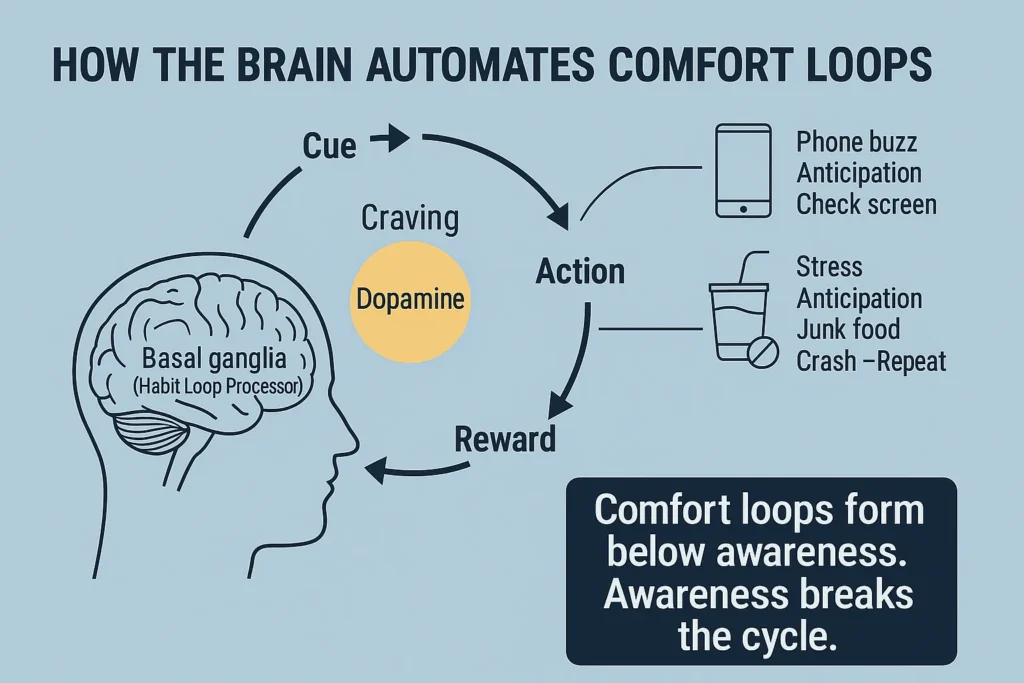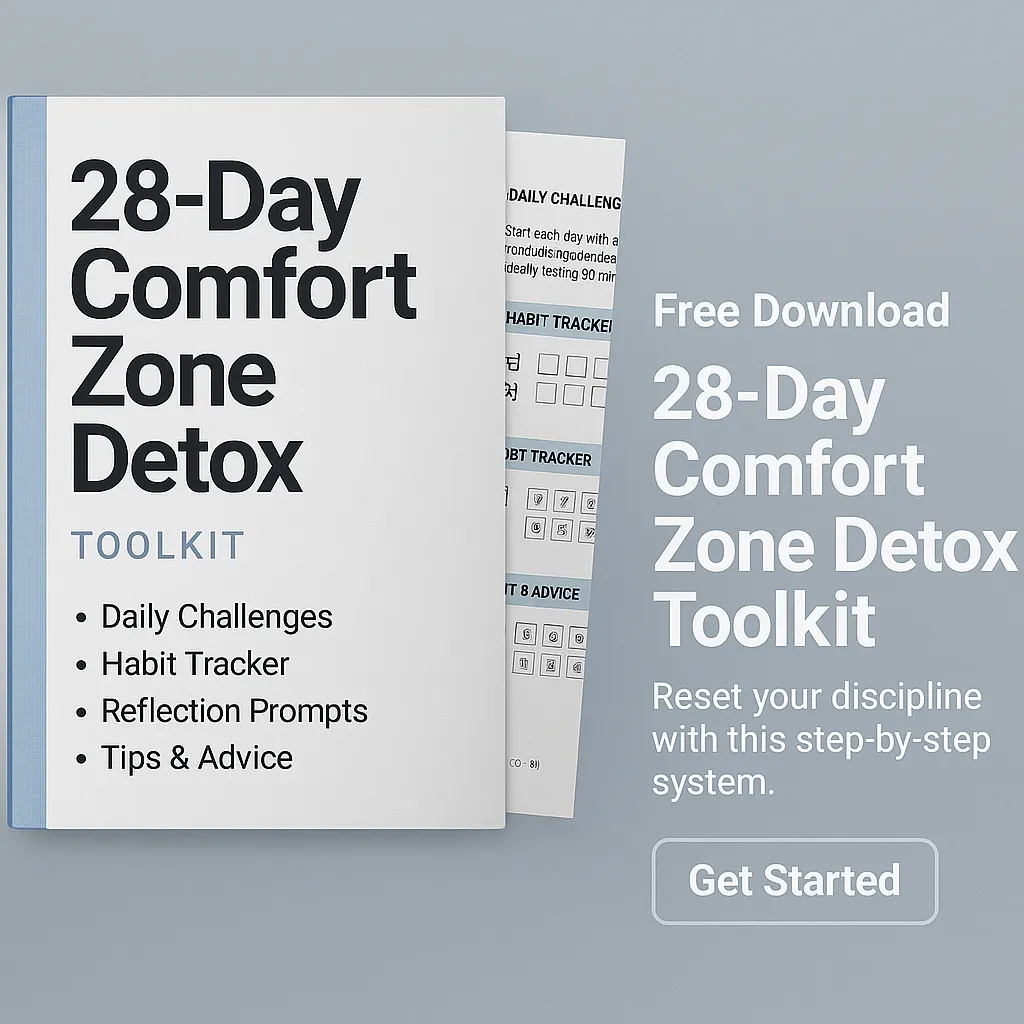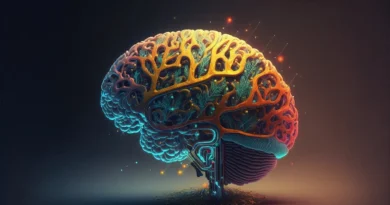Why Comfort Is Killing Your Edge: A Science-Backed Guide to Reclaiming Discipline
We were not designed for constant ease. Yet for many, ease has become the norm, delivered through screens, processed food, and every modern convenience. What once felt like a reward is now the baseline. And that baseline is reshaping how we think, move, and respond to challenge.
Comfort, in excess, does not create peace. It creates stagnation. It erodes urgency, blunts resilience, and dulls the instinct to grow. Slowly, it pulls us away from the practices that build strength, mentally and physically.
This article explores why too much comfort undermines personal discipline. Backed by neuroscience and evolutionary biology, it offers a structured framework to reset habits, restore clarity, and build the capacity to act, even when it’s hard.
The Hidden Machinery of Comfort
Comfort is not just a feeling. It is a pattern, reinforced neurologically and behaviorally by the systems around us.
The basal ganglia, a deep structure in the brain, helps turn repeated decisions into automatic habits. Over time, the brain offloads effort by automating behavior. Actions like checking your phone, skipping workouts, or eating when bored stop being choices and become loops. These loops are maintained by dopamine, a chemical that motivates pursuit, not just reward.
According to Nature Neuroscience (2020), repeated exposure to dopamine-triggering cues, especially digital ones, leads to strong behavioral retention even when the actual reward diminishes. This means you may keep reaching for your phone, or snacks, or mindless content, even if it no longer satisfies you.
What feels like procrastination is often the result of neurochemical patterns that can feel nearly automatic.

The Evolutionary Mismatch
Our ancestors lived in a world that required effort. Movement was necessary for survival, and silence was normal. Today, the inverse is true. We move little, yet think constantly. We stimulate without substance.
Anthropologist Daniel Lieberman, author of Exercised (2021), notes that prehistoric humans did not exercise for health. They exerted themselves to eat, build, and escape danger. Modern exercise and effort must be deliberately chosen, and that choice runs against millennia of conservation instincts.
A 2021 review in Frontiers in Psychology found that chronic overstimulation from screens and digital environments is associated with reduced executive function and increased anxiety. When challenge is removed, the brain loses its tolerance for resistance.
Additional research from Harvard Health highlights that consistent physical activity directly improves brain function, attention span, and emotional regulation. What feels like movement for the body is medicine for the brain.
What Comfort Steals from You
- Mental clarity. The mind becomes cloudy with overstimulation and constant consumption. Clarity comes through space and stillness.
- Self-trust. When you set goals and abandon them, your nervous system learns not to take your intentions seriously.
- Resilience. Without friction, the capacity to endure stress atrophies. This impacts mental health and immune function.
- Time. Small acts of avoidance seem harmless, but they add up to lost months and years.
Avoiding discomfort is not neutral. It is expensive. And the price is often invisible until it is too late.
How to Break the Loop: A Framework for Change
This four-phase framework is designed to disrupt harmful habits and rebuild your capacity for discomfort, focus, and follow-through.
1. Interrupt Automatic Loops
Habits feel like decisions, but they are often reflexes. This phase focuses on identifying and interrupting the unconscious behaviors that keep you passive:
- Picking up your phone before standing up
- Consuming instead of creating
- Using background noise to avoid thought
- Reaching for easy food or entertainment during emotional dips
2. Reclaim the Body’s Role
Physical activity, posture, and breath directly affect mood and resilience. According to the Journal of Health Psychology, even short bouts of movement can increase executive control and stress response.
You do not need a complicated routine. You need deliberate, daily physical engagement. Resistance teaches the body to feel safe under stress.
3. Strengthen Cognitive Load Tolerance
Modern minds are overloaded with inputs but underdeveloped in focus. Mental resilience is built by subtracting noise and sitting with discomfort:
- Read without distraction
- Write without prompts
- Meditate without music
- Do complex thinking without quick rewards
Studies show that cognitive strain followed by rest improves memory, creativity, and emotional regulation (Cerebral Cortex, 2018).
4. Rebuild Identity Through Repetition
Discipline is not a personality trait. It is a system. You strengthen it through:
- Non-negotiable habits
- Identity-anchoring language
- Ritualized self-check-ins
- Environmental cues
You do not become disciplined by thinking differently. You become disciplined by doing difficult things consistently, until the new pattern feels familiar.
Try These Today: 3 Small Steps to Begin
- Delay Phone Use for 60 Minutes After Waking
No screens. Move, write, breathe, or walk. Set your mind before the world speaks into it. - Silence Fast for 20 Minutes Daily
No music, talking, or input. Just stillness. Let your brain detox from narrative addiction. - Finish One Task You’ve Been Avoiding
Completion builds momentum and reduces mental clutter. Choose one small thing. Finish it without escape.
These practices are not hacks. They are acts of recovery.
Download the 28-Day Comfort Zone Detox Toolkit (Free or Pay What You Want)
Start the 28-day reset that rebuilds your focus, strength, and discipline. This toolkit includes the full four-phase system, daily challenges, printable trackers, guided audio reflections, habit-building worksheets, and more.
It was built as a premium product,but right now, it’s yours. Free, or whatever you feel it’s worth.
Download the Complete Toolkit on Gumroad
No friction. No barrier. Just the system. Use it fully.

Written by J.D. Wilson, with research reviewed by the Fitsnip Editorial Team
Sources: Nature Neuroscience, Frontiers in Psychology, APA Journals, Daniel Lieberman, Harvard Health, Cerebral Cortex, Huberman Lab.
J.D. Wilson is an Integrative Health Specialist, Certified Meditation Teacher, and author of The Comfort Trap: The Quiet Cost of an Unchallenged Life. He founded Fitsnip.com to translate complex research into practical systems for longevity and mental clarity.
About: https://fitsnip.com/about




